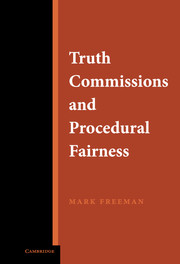Book contents
- Frontmatter
- Contents
- Foreword
- Preface
- Acknowledgments
- Abbreviations
- Part I
- 1 Truth Commissions
- 2 Procedural Fairness
- Part II
- Summary of Recommendations
- Appendix 1 Table of Truth Commissions
- Appendix 2 Primary Materials on Truth Commissions
- Appendix 3 Primary Materials on Other Commissions of Inquiry
- Index
2 - Procedural Fairness
Published online by Cambridge University Press: 27 October 2009
- Frontmatter
- Contents
- Foreword
- Preface
- Acknowledgments
- Abbreviations
- Part I
- 1 Truth Commissions
- 2 Procedural Fairness
- Part II
- Summary of Recommendations
- Appendix 1 Table of Truth Commissions
- Appendix 2 Primary Materials on Truth Commissions
- Appendix 3 Primary Materials on Other Commissions of Inquiry
- Index
Summary
Introduction
In any human rights investigation – judicial, quasi-judicial, or nonjudicial – there is a duty on the part of the investigating body to be fair. There is, however, no such thing as a universally applicable standard of fairness. Instead, what is fair in any investigation or proceeding will depend on many factors including, in particular, the nature and severity of the consequences that may result. Thus, the standard of fairness one will encounter in a criminal prosecution (where the worst consequence might be the death penalty or life imprisonment) will tend to be greater than that encountered in a civil suit in small claims court (where the worst consequence might be the loss of $25,000) or in a disciplinary process (where the worst consequence might be a loss of employment) or in a coroner's inquest (where the worst consequence might be reputational damage). The challenge is to define parameters and measures of fairness that are appropriate to the particular investigation or proceeding. The central purpose of this chapter is to make that assessment in the specific case of truth commissions.
The chapter begins with an overview of the international standards that are most relevant to a conception of procedural fairness for truth commissions, namely, human rights law, nontreaty standards concerning commissions of inquiry, and nontreaty standards concerning the treatment of victims of human rights violations. This is followed by an analysis of relevant standards of fairness in use in domestic jurisdictions.
- Type
- Chapter
- Information
- Truth Commissions and Procedural Fairness , pp. 88 - 156Publisher: Cambridge University PressPrint publication year: 2006



